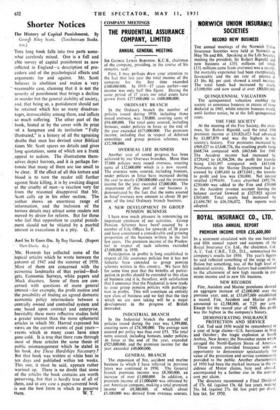Shorter Notices
rhe History of Capital Punishment. By
Tins long book falls into two parts some- . what carelessly mixed. One is a full and able survey of capital punishment as now inflicted in England—a description of pro- cedure and of the psychological effects and arguments for and against. Mr. Scott believes in abolition and makes a very
--reasonable case, claiming that it is not the severity of punishment that brings a decline in murder but the general stability of society, and, that being so, a punishment should not be retained which has so many disadvan- tages, irrevocability among them, and inflicts so much suffering. The other part of the book, hinted at by the cover with its print 'of a hangman and its invitation "Fully illustrated," is a history of all the agonising deaths that man has devised since Biblical times Mr. Scott spares no details and gives long quotations, some of which are a frank appeal to sadism. The illustrations them- selves depict horrors, and it is perhaps for- . tunate that many of them are too small to be clear. If the effect of all this torture and blood is to turn the reader still further against State killing, it is by awaking disgust at the cruelty of man—a reaction very far from the reasoned disapproval that Mr. Scott calls up in his other section. The author shows an enormous range of 'information, and the inclusion of the torture details may attract some readers not moved by desire for reform. But for those who feel that opposition to capital punish- . ment should not be vitiated by a morbid
interest in executions it is a pity. G. F.


































 Previous page
Previous page